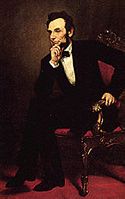Abraham Lincoln (March 4, 1861 - April 15, 1865)
Abraham Lincoln (February 12, 1809 - April 15, 1865) was the sixteenth President of the United States, serving from March 4, 1861 until his assassination. As an outspoken opponent of the expansion of slavery in the United States, Lincoln won the Republican Party nomination in 1860 and was elected president later that year. During his term, he helped preserve the United States by leading the defeat of the secessionist Confederate States of America in the American Civil War. He introduced measures that resulted in the abolition of slavery, issuing his Emancipation Proclamation in 1863 and promoting the passage of the Thirteenth Amendment to the Constitution in 1865.
 Lincoln closely supervised the victorious war effort, especially the selection of top generals, including Ulysses S. Grant. Historians have concluded that he handled the factions of the Republican Party well, bringing leaders of each faction into his cabinet and forcing them to cooperate. Lincoln successfully defused a war scare with the United Kingdom in 1861. Under his leadership, the Union took control of the border slave states at the start of the war. Additionally, he managed his own reelection in the 1864 presidential election.
Lincoln closely supervised the victorious war effort, especially the selection of top generals, including Ulysses S. Grant. Historians have concluded that he handled the factions of the Republican Party well, bringing leaders of each faction into his cabinet and forcing them to cooperate. Lincoln successfully defused a war scare with the United Kingdom in 1861. Under his leadership, the Union took control of the border slave states at the start of the war. Additionally, he managed his own reelection in the 1864 presidential election.
Opponents of the war (also known as "Copperheads") criticized him for refusing to compromise on the slavery issue. Conversely, the Radical Republicans, an abolitionist faction of the Republican Party, criticized him for moving too slowly in abolishing slavery. Even with these problems, Lincoln successfully rallied public opinion through his rhetoric and speeches; his Gettysburg Address is but one example of this. At the close of the war, Lincoln held a moderate view of Reconstruction, seeking to speedily reunite the nation through a policy of generous reconciliation. His assassination in 1865 was the first presidential assassination in U.S. history and made him a martyr for the ideal of national unity.¹
Quotes
"Those who deny freedom to others deserve it not for themselves, and under a just God, cannot long retain it.""And in the end it's not the years in your life that count. It's the life in your years."
"Better to remain silent and be thought a fool than to speak out and remove all doubt."
"Give me six hours to chop down a tree and I will spend the first four sharpening the axe."
"Whenever I hear anyone arguing for slavery, I feel a strong impulse to see it tried on him personally."
Noteworthy Sites
- ¹ Abraham Lincoln - Wikipedia, the free encyclopedia
- Books on Abraham Lincoln

- Abraham Lincoln Posters & Prints
- Biography of Abraham Lincoln
- Essays on Abraham Lincoln and His Administration
- Abraham Lincoln Research Site
- Abraham Lincoln Historical Digitization Project
- Lincoln Studies: Abraham Lincoln and the American Civil War
- C-Span: Lincoln 200 Years
"An investment in knowledge always pays the best interest." ~ Benjamin Franklin
read more
If you would like to read more about history and the presidents, visit our history bookstore.
... a thousand words
Bring history and education to life with posters and art prints in the following categories:
- U.S. Presidents
- Political Science
- Space Exploration
- Literature
- Military & Warfare
- Geography
- Activists
- Science
- Educational
"To read without reflecting is like eating without digesting." ~ Edmund Burke